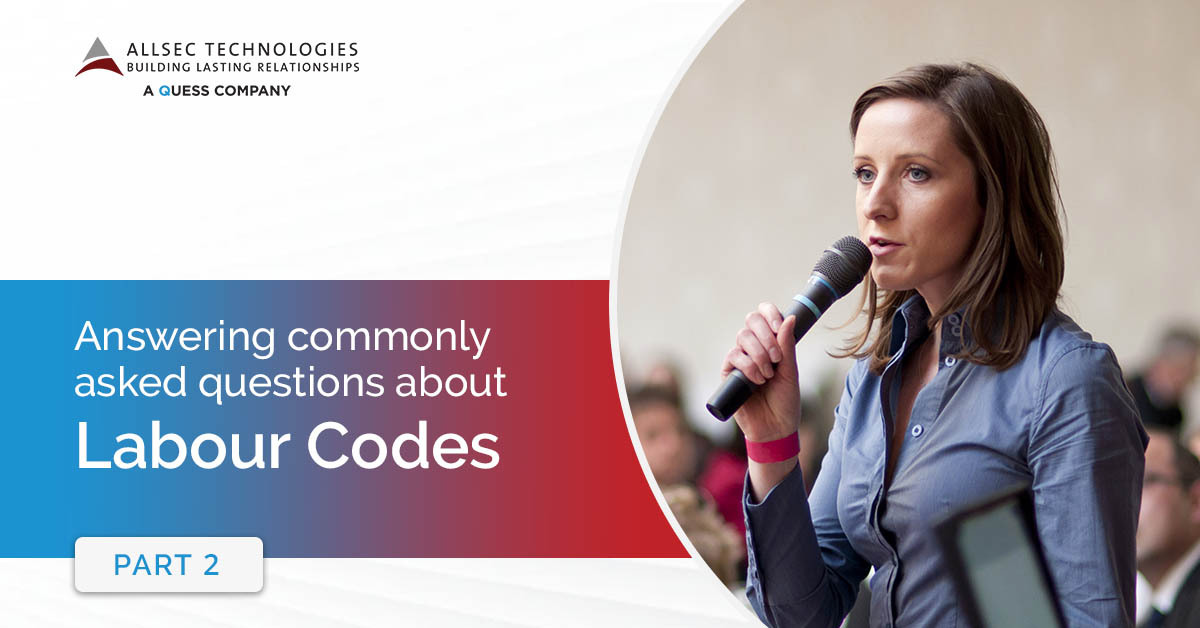
While the Indian Government is the verge of implementing the new labour codes, many businesses still have plenty of unanswered questions. In this first part of this article, we answered eight frequently asked questions about the Labour Laws. In this article, we will go further and answer some more questions so that you are up to date with all the developments and have a clear understanding of the law.
Frequently Asked Questions
1. What will be the status of the Shops and Establishments Act? Will the compliance requirements under the same continue?
Shops and Establishments Acts are state-specific legislations which are not repealed by the Central Government under the Labour Codes. The same shall continue to prevail even after the implementation of the new proposed Labour Codes. The establishments covered under the Shops and Establishments Act will still be governed by the said law. Nevertheless, as the process of the new Labour Codes evolves, the Shops and Establishments Act is expected to undergo certain changes to fall in line with the new Labour Codes provisions.
2. Do we still need to continue with the register preparation under all applicable Acts separately?
Under the new labour codes most of the registers are integrated and unified for the subsumed acts. However, the elements required to be captured are more or less the same. But for other applicable Acts which are not subsumed under the labour codes, the register maintenance must be continued as per the respective rules.
3. Is there any impact on PF/ESIC threshold limit due to the new Labour Codes?
As of now, the government has not made any official notification on enhancement of PF and ESIC threshold limits. However, these thresholds are always subject to change even under the existing regime. The concept of threshold limits under the current schemes shall continue for another year after the implementation of the new Social Security Code 2020. However the value/figure of the threshold limits are always subject to change by way of appropriate notification.
4. Are the requirement of appointment letters format different for all states?
Yes, the format differs from state to state. However, the requirement is as per the new OSH Code 2020 and would apply for all states and union territories.
5. Are gratuity and leave encashment calculated on basic or fixed gross salary?
Post implementation of the Labour Codes, gratuity must be calculated on the entire included portion of the wages. Whereas for leave encashment, if the current practice of encashment is on basic wages, then the same is required to be made on included wages. If the current practice of encashment is on fixed gross salary, then the same shall continue as the better benefit shall prevail.
6. Is it really mandatory to encash the eligible leaves to employee at the time of leaving?
Leave encashment are governed as per the provisions of Shops & Establishment Act or Factories Act, as the case may be. And under the said legislations, the leave encashment on exit is mandatory for eligible employees.
7. As per the new Code, how is gratuity applicable to fixed term employees? For instance, if a fixed term employee has worked for 3 months, will he qualify for prorated gratuity?
As per the Code on Social Security Rules, 2020, a fixed term employee shall be eligible for prorated gratuity only if he renders service under the contract for a period of at least one year. Hence, an employee under fixed term for three months may not qualify for prorated gratuity.
8. Will there be any changes in the statutory bonus eligibility criteria limit from the current threshold of INR 21000 once the new labour codes are implemented?
Under the proposed Labour Codes, the appropriate government has the authority to prescribe the eligibility threshold limit for the statutory bonus. Hence, we need to wait and watch if there is going to be any change notified in this regard.
Final Word
That’s the rundown of all the FAQs on the new Labour Codes. Hope these answer your questions and you are ready to make the necessary changes. Reach out to our labour law experts if you need help making a quick, cost-effective and legally compliant transition.


